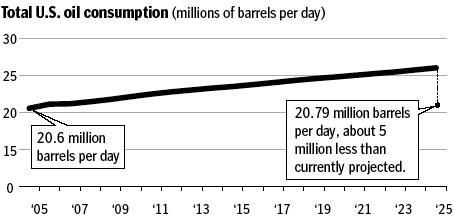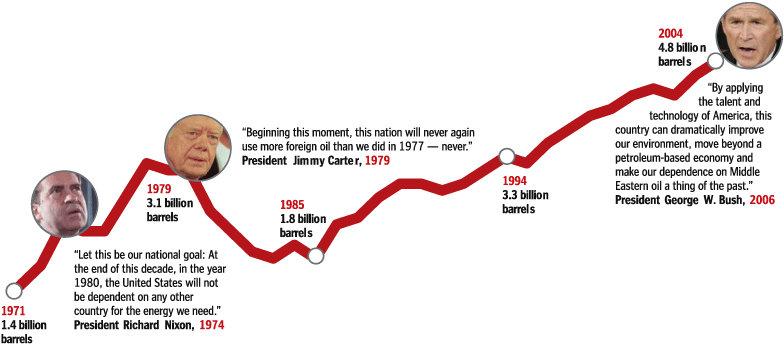

Making an Oil Pledge
Declaration of Undependence Rests on New Energy Sources
By Justin Blum
Washington Post Staff Writer
Thursday, February 2, 2006
President Bush set an ambitious goal in his State of the Union address: break the country's addiction to oil and move beyond a petroleum-based economy.
Bush's remarks on Tuesday night follow in the path of previous U.S. presidents, including Richard M. Nixon and Jimmy Carter, who pledged to limit reliance on foreign oil.
 (Photo By Pablo Krisch -- Associated Press; Graphic By Karen Yourish And Tan Ly -- The Washington Post; Source: Energy Information Administration) |
|
Switchgrass Power
During his State of the Union address Tuesday night, President Bush said fuel can be made from "switchgrass," leading to much head-scratching.
Switchgrass ( Panicum virgatum ), a hardy perennial, can grow up to eight feet tall. Though its power output is only about 75 percent that of coal, its carbon dioxide and sulfur dioxide emissions are much lower. |
| Graphics Total Annual Imports Total U.S. Oil Consumption |
But those goals have remained elusive. In 1973, the United States consumed 17.3 million barrels per day of oil. Today, that number is up to 20.6 million barrels per day. The percentage of imported oil has risen more sharply over the period, increasing from nearly 35 percent to 60 percent.
That growing demand has made the United States all the more dependent on oil from what Bush called "unstable parts of the world."
He said technological breakthroughs encouraged by his plan "will help us reach another great goal: to replace more than 75 percent of our oil imports from the Middle East by 2025."
But short of imposing bans or embargoes, the U.S. government can do little to prevent companies from buying oil from any nation they can. White House officials acknowledged yesterday that their plan would not necessarily reduce imports from the Middle East because that determination is made by market conditions and not U.S. directives.
Additionally, the world's oil market is so interdependent that even if the United States ceased buying oil from all Middle Eastern nations, a disruption in the flow of Middle East oil to other countries would affect American prices.
What is possible is reducing the U.S. dependence on oil by finding alternatives, which the administration hopes to do. Bush's vision -- to "move beyond a petroleum-based economy and make our dependence on Middle Eastern oil a thing of the past" -- would require dramatic changes in the U.S. economy. The plan detailed by the White House would move -- albeit slowly -- toward that goal.
The president called for more funding for research into new forms of ethanol production, hydrogen and new hybrid vehicle technology, saying those would displace some domestic oil consumption. The administration is calling for $469 million in funding for those measures in 2007, an increase of nearly $119 million.
The White House estimates the plan would result in a savings of about 5 million barrels per day by 2025. But because oil consumption is continuing to increase, the United States would still use slightly more oil in 2025 than it does today, according to government projections.
Craig Stevens, an Energy Department spokesman, said the administration thinks the United States would move away from an oil-based economy sometime after 2025. But the administration could not say when that is likely to occur. "It will take time," Stevens said. "We're taking the first steps now."
Bush's energy push comes at a time when the world is demanding more oil than ever to fuel growing economies. But producers are struggling to keep up, resulting in higher prices and concerns about shortfalls.
The U.S. economy has been burdened by higher oil prices, dulling economic growth. In recent days, oil prices have been flirting with $70 a barrel, partly the result of concerns about how world powers will react to the nuclear ambitions of Iran, a major oil producer.
The White House wants to accelerate research into the production of "cellulosic ethanol" from plant fiber, an abundant renewable resource. The president talked about making the fuel from wood chips, stalks and switchgrass, which is commonly found in North America.
The technology exists to produce that type of ethanol today but not at competitive prices, industry specialists said. Most of the ethanol now produced domestically comes from corn. The administration wants to make cellulosic ethanol competitive within six years. Proponents of the idea say that once that happens, automakers would increase production of "flex fuel" vehicles that could run on gasoline or fuels primarily made from ethanol.
The oil provisions are part of a larger Bush vision of increasing funding for alternative energy sources. The White House is calling for more to be spent on research into cleaner-burning coal, solar and wind power.
The president's comments may seem like a departure for a former Texas oilman who has frequently championed additional domestic oil production. But the White House said Bush is standing by his policies of the past, as well: The president continues to support increased oil drilling in the United States, including in Alaska's Arctic National Wildlife Refuge, a measure rejected by Congress last year.
Environmentalists dismissed Bush's State of the Union plans as window dressing that would change little. They said Bush could have made a more significant impact on oil consumption by calling for an increase in automobile mileage requirements. "The energy package clearly appears to be something that they said, 'Okay, what can we cobble together and make it look like we're actually doing something?' " said David Hamilton, director of the Sierra Club's global warming and energy program.
Total Annual Imports
Over the years, several presidents have called for curbing the nation's consumption of oil — especially imported oil — only to watch total imports grow since 1971.
Oil Addiction
Under President Bush's plan, U.S. oil consumption would be slightly more than it is today in 2025.

